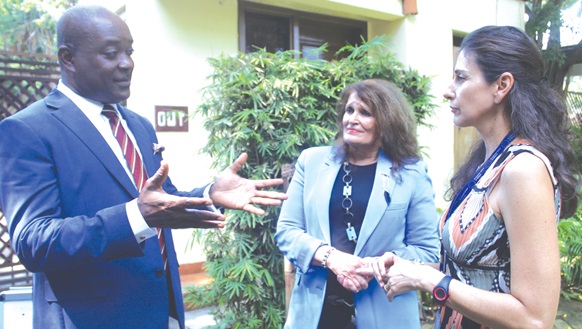
Centralised admission form system for prospective university student being piloted by GTEC
A system that will enable prospective university students to apply for admission through a centralised platform will be rolled out by the Ghana Tertiary Education Commission (GTEC) from next week.
The Centralised Application Processing System (CAPS) will replace the old system where prospective students needed to buy multiple forms to apply to different institutions.
The Director-General of GTEC, Professor Ahmed Jinapor, disclosed this in Accra yesterday at the opening of a capacity development and networking programme on the African Continental Qualifications Framework (ACQF) project for participants from about 20 African countries.
He said the new centralised system would be piloted in 10 public and private institutions.
These are the Kwame Nkrumah University of Science and Technology (KNUST), the Kumasi Technical University, Akenten Appiah-Menka University of Skills Training and Entrepreneurship Development, Christian Service University, the Garden City University, the Catholic University Ghana, the Bolgatanga Technical University, the C.K. Tedem University of Technology and Applied Sciences, the Presbyterian University, Ghana, and the Simon Diedong Dombo University of Business and Integrated Development Studies.
Prof. Jinapor said the practice of students buying the same forms from different institutions was not the best.
“We want to have a situation whereby we would have a platform for all institutions in the country, of all their programmes such that if you want to apply to the University of Ghana, KNUST or Ashesi, all you need is to go onto the platform, buy a form and apply to each of them," he said.
Capacity development
The GTEC Director-General said the commission would want to start full implementation from the next academic year.
“We believe that when this platform is put out there, institutions would get the opportunity of being advertised.
It is not only happening here in Ghana; when you go the UK, they have such a system.
When you go to most of the European countries, that is what they are doing,” he said.
Prof. Jinapor said the system would be able to source applicants’ results from the West African Examinations Council (WAEC).
That, he said, would help to weed out people who applied with fake results.
Participating countries
Participants in the programme are drawn from Ghana, Angola, Guinea-Bissau, Eswatini, Mozambique, Democratic Republic of Congo, Senegal, Sierra Leone, Zambia, Kenya, Cabo Verde, Malawi, Madagascar, Mauritania, Cameroun, South Africa and South Sudan.
The project is an African Union and European Union (EU) partnership initiative that started in 2020.
It is in its second phase and will go on with various activities until the end of 2026.
Sharing experiences
The Coordinator of the ACQF project, Eduarda Castel-Blanco, said Ghana had a lot to share, and that many other countries were looking at the country’s experience in various areas.
“We are grateful to Ghana for co-hosting the second workshop for our programme in 2023,” she said.
The EU Delegation to Ghana Programme Officer (Education), Marta Brignone, said the AQCF was one of the programmes under the Youth Mobility for Africa, a flagship initiative on education and skills development.
She said the EU in Ghana was very active in educational skills development, especially with the launch of the new partnership on skills in January this year.
Ms Brignone said the EU was working with the Ministry of Education, particularly with the GTEC and the Technical Vocational Education and Training (TVET) Commission, and the TVET Service.
Contribution
The training programme of the ACQF-II 2023 project contributes to enhance knowledge and understanding on the development and operationalisation of national qualification frameworks, moving from initial ideas to policies, and from policies to action.
